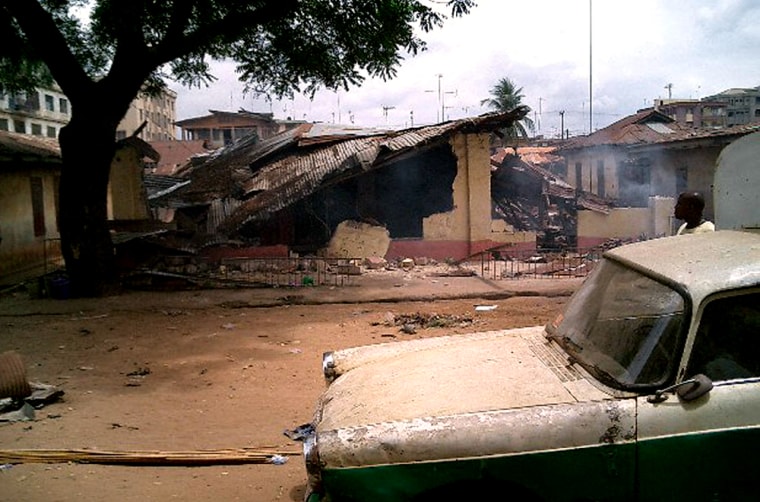Christian youths burned the corpses of Muslims on Thursday on the streets of Onitsha in southeastern Nigeria, the city worst hit by religious riots that have killed at least 138 people across the country in five days.
Christian mobs, seeking revenge for the killings of Christians in the north, attacked Muslims with cutlasses, destroyed their houses and torched mosques in two days of violence in Onitsha, where at least 85 people have died.
“We are very happy that this thing is happening so that the north will learn their lesson,” said Anthony Umai, a motorcycle taxi rider, standing close to where Christian youths had piled up the corpses of 10 Muslims and were burning them.
Dozens more corpses had been thrown into the back of pick-up trucks by security services overnight, residents said.
Political differences aggravating violence
Uncertainty over the political future is aggravating regional, ethnic and religious rivalries in Africa’s most populous nation. Militants in the oil-producing south have waged a three-month campaign of attacks and kidnappings against the oil industry, which has cut exports and driven up oil prices.
There was no fighting in Onitsha on Thursday but Emeka Umeh, of human rights group the Civil Liberties Organization, called it “the peace of the graveyard."
Some corpses were still lying on the streets and hundreds of Muslim men, women and children fled the city crammed into open-top trucks for fear of more killings. Thousands more were hiding in army barracks and police stations.
Umeh said most of the 85 bodies his group counted were Hausa, but some Ibo were killed too. The Hausa are the main ethnic group in northern Nigeria and most are Muslim, while the Ibo are dominant in the southeast and almost all are Christian.
Tensions high during funerals
In northern Maiduguri, where the Christian Association of Nigeria says 50 Christians were killed in a weekend riot that began as a protest against cartoons of the Prophet Mohammad, tensions were high during several Christian funeral masses.
The Red Cross said at least 21 people died in Maiduguri.
A crowd of Christian youths broke away from the burial of one of the victims, a Catholic priest, and ran shouting through the streets before police dispersed them.
At the funeral of 13 children from two families who were burnt in their houses, mourners wailed as police stood by.
News of the Maiduguri murders set off the bloodletting in Onitsha, and tit-for-tat violence spread on Wednesday to Enugu, another southeastern city, where seven people were killed.
Nigeria’s 140 million people are divided about equally between Muslims in the north and Christians in the south, but sizeable religious minorities live in both regions.
Thousands of people have been killed in religious violence in Africa’s top oil exporter since the restoration of democracy in 1999. Killings in one part of the country often spark reprisals elsewhere.
The triggers for riots that killed at least at least 46 people, mostly Christians, in northern Maiduguri, Bauchi and Katsina, were different, but religious and secular leaders have linked them to political tensions.
Upcoming elections in 2007
Elections are due in 2007 and many Nigerians believe President Olusegun Obasanjo will try to stay on after eight years in power. The prospect angers those who feel the time has come for their ethnic or regional group to get the top job.
In Bauchi, an alleged blasphemy started the trouble, while in Katsina it was a constitutional review that many see as an attempt to keep Obasanjo in power.
The constitution bars Obasanjo, a Christian from the southwest, from seeking a third term in 2007 and he says he will uphold the charter. But he has declined to comment on a powerful movement to amend the constitution to allow him to stay.
Maiduguri and Katsina are both hosting public hearings on constitutional reform this week which many Nigerians believe are geared towards furthering the so-called third term agenda.
